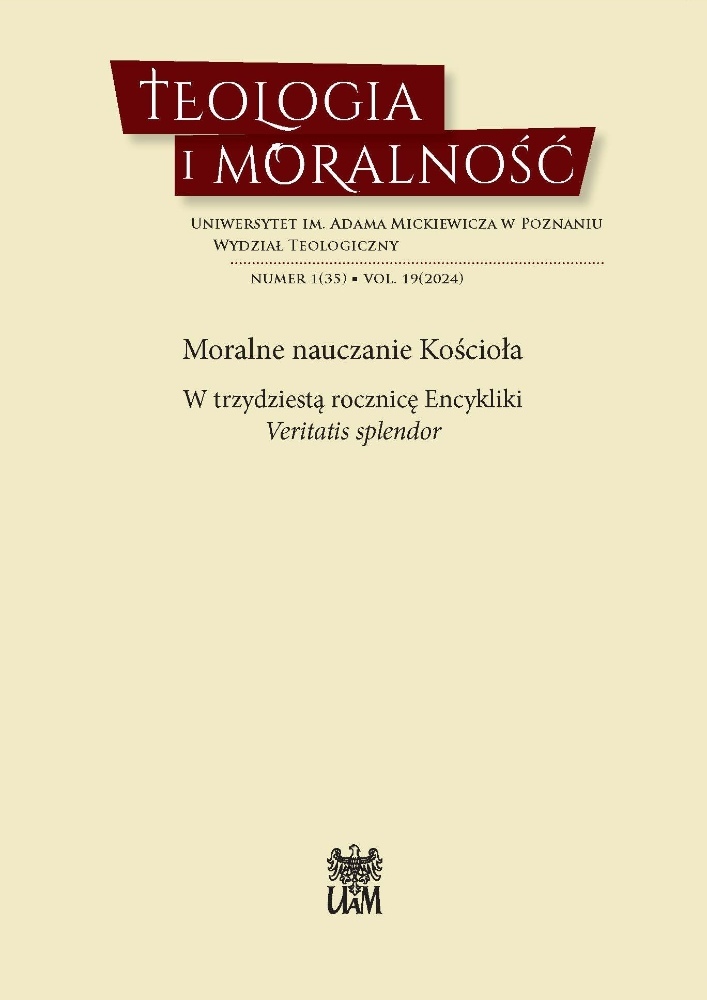Abstrakt
Celem artykułu jest ukazanie, dlaczego i w jaki sposób dynamiczny rozwój sztucznej inteligencji może i powinien stanowić przedmiot zainteresowania dyscypliny nauk teologicznych. W pierwszej kolejności autor przekonuje, że artefakty technologiczne, stanowiące część kultury, mogą być traktowane jako jedne z nowych „miejsc” człowieka, a w ten sposób także miejsc teologicznych. Namysł nad algorytmami tworzonymi w celu naśladowania i zastępowania inteligentnych działań ludzi prowadzi do stawiania w nowym kontekście pytań o naturę człowieka, jego funkcjonowanie oraz przeznaczenie. Autor analizuje w jaki sposób współbrzmi to ze współczesnymi zadaniami oraz metodami uprawiania teologii. W dalszej kolejności, autor analizuje kontekst definiowania pojęcia sztucznej inteligencji oraz wskazuje na związane z tym implikacje. W ostatniej części dokonano analizy w jaki sposób etyka, także ta uprawiana na gruncie teologii, może przyczynić się do kształtowania rozwoju sztucznej inteligencji. Całość wywodu prowadzi do wniosku, że w kontekście fenomenu sztucznej inteligencji, teologia, dzięki swojej unikalnej perspektywie, może odgrywać znaczącą i pozytywną rolę. Otwiera to dyscyplinie nauk teologicznych nowe i twórcze możliwości sprawowania służby na rzecz wiary i kultury.
Bibliografia
AlgorthmWatch. 2020. Dostęp: 05.09.2023. https://inventory.algorithmwatch.org.
Benanti, Paolo. 2016. Homo Faber. The Techno-Human Condition. Bolonia: EDB.
Benanti, Paolo. 2019. “Artificial Intelligences, Robots, Bio-engineering and Cyborgs: New Challenges for Theology?” Concilium (00105236), Issue 3: 34-47.
Benanti, Paolo. 2021. La grande invenzione. Il linguaggio come tecnologia, dalle pitture rupestri al GPT-3. San Paolo Edizioni.
Benanti, Paolo. 2023. “The urgency of an algorethics.” Discover Artifi cial Intelligence, 3: 11. Springer. DOI: https://doi.org/10.1007/s44163-023-00056-6
Benasayag, Miguel. 2019. Funzionare o esistere? Vita e Pensiero.
Bringsjord, Selmer, Paul Bello and David Ferrucci. 2001. “Creativity, the Turing Test, and the (Better) Lovelace Test.” In: Minds and Machines, 11: 3-27.
Churchil, Winston. 1943. Cytowany w: Volchenkov, Dimitri. 2018. „Grammar of Complexity: From Mathematics to a Sustainable World,World Scientific Publishing Company”.
Crawford, Kate. 2021. Atlas of AI: Power, Politics, and the Planetary Costs of Artificial Intelligence. Yale University Press. New Heaven and London. DOI: https://doi.org/10.12987/9780300252392
Crook, Nigel and Corneli. 2021. “The Anatomy of moral agency: A theological and neuroscience inspired model of virtue ethics.” Cognitive Computation and Systems, Volume 3, Issue 2: 109-122. DOI: https://doi.org/10.1049/ccs2.12024
Dastin, Jeff rey. 2018. Amazon scraps secret AI recruiting tool that showed bias against women.Dostęp: 05.09.2023. https://www.reuters.com/article/us-amazon-com-jobs-automation-insight-idUSKCN1MK08G.
Dignum, Virginia. 2019. Responsible Artificial Intelligence: How to Develop and Use AI in a Responsible Way. Springer Nature Switzerland. DOI: https://doi.org/10.1007/978-3-030-30371-6
Dzidek, Tadeusz i Piotr Sikora. 2018. „Metody”. W: Poznanie teologiczne, red. T. Dzidek, Ł. Kamykowski i A. Napiorkowski, 151–174 (Teologia Fundamentalna, 5). Krakow: Uniwersytet Papieski Jana Pawła II w Krakowie. Wydawnictwo Naukowe. DOI: https://doi.org/10.15633/9788374387262.06
Dreyfus, Hubert. 1992. What Computers Can’t Do: The Limits of Artificial Intelligence. The MIT Press.
Encyklopedia PWN. Sztuczna inteligencja. Dostęp: 05.09.2023. https://encyklopedia.pwn.pl/haslo/sztuczna-inteligencja;3983490.html.
Floridi, Luciano. 2007. “A Look into the Future Impact of ICT on Our Lives.” In: The Information Society, Volume 23: 59-64.
Floridi, Luciano. 2023. The Ethics of Artificial Intelligence: Principles, Challenges, and Opportunities. OUP Oxford. DOI: https://doi.org/10.1093/oso/9780198883098.001.0001
Franciszek. 2017. Konstytucja Apostolska „Veritatis gaudium” o uniwersytetach i wydziałach kościelnych.
Lemoine, Blake 2022. Scientific Data and Religious Opinions. Dostęp: 05.09.2023. https://cajundiscordian.medium.com/scientific-data-and-religious-opinions-ff 9b0938fc10.
Marks, Robert J. 2022. Non-Computable You: What You Do That Artificial Intelligence Never Will. Discovery Institute Press.
OpenAI. 2023. „About”. Dostęp: 05.09.2023. https://openai.com/about.
Puzio, Anna. 2023. “Theology Meets AI: Examining Perspectives, Tasks, and Theses on the Intersection of Technology and Religion.” In: Alexa, wie hast du’s mit der Religion? Theologische Zugange zu Technik und Kunstlicher Intelligenz Theologie und Kunstliche Intelligenz, Vol. 1. Darmstadt: wbg Academic.
Rome Call for AI Ethics. 2020. Dostęp: 05.09.2023. https://www.romecall.org/the-call/.
Schneider, Susan. 2019. Artificial you: AI and the future of your mind. Princeton University Press. New Jersey & Oxfordshire. DOI: https://doi.org/10.1515/9780691197777
Stachewicz, Krzysztof. 2020. „Karol Wojtyła’s philosophy of freedom”. Teologia i Moralność, 15(2020), nr 1(27). DOI: https://doi.org/10.14746/tim.2020.27.1.10
Turing, Alan. 1950. “Computing Machinery and Intelligence.” Mind, vol. LIX, no. 236.
Wynsberghe van, Aimee and Robbins Scott. 2018. “Critiquing the Reasons for Making Artificial Moral Agents.” Sci Eng Ethics, 25(2019): 719-735.
Zatwardnicki, Sławomir. 2018. „Wizja teologii w wypowiedziach papieża Franciszka”. Rocznik Teologii Katolickiej, t. XVII, 3: 237-257.
Zhang, Daniel et al. 2021. The AI Index 2021 Annual Report, AI Index Steering Committee, Human-Centered AI Institute, Stanford University, Stanford.
Licencja
Prawa autorskie (c) 2024 Maciej Mróz

Utwór dostępny jest na licencji Creative Commons Uznanie autorstwa 4.0 Międzynarodowe.

